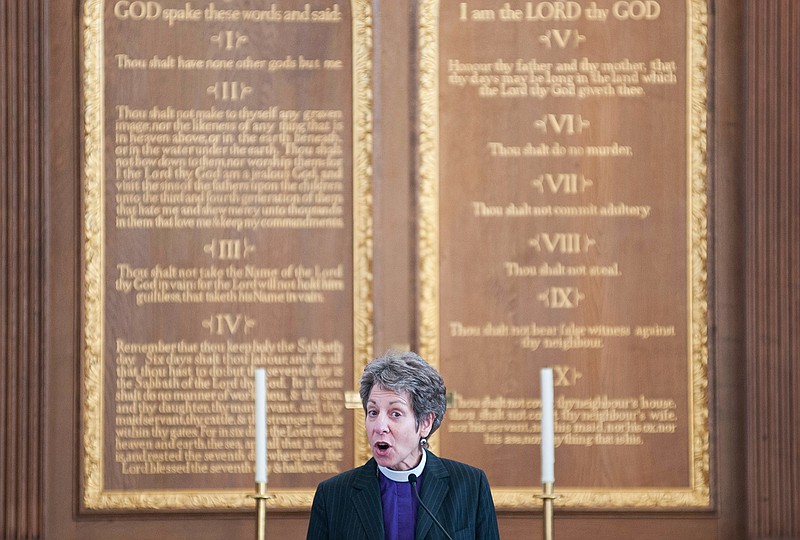According to Rev. Katharine Jefferts Schori, presiding bishop of the Episcopal Church, USA, science and religion have more in common than most people would think.
In her 2014 C.S. Lewis Lecture at Westminster College Thursday morning, Jefferts Schori told those gathered in the Church of St. Mary the Virgin, Aldermanbury that the "Great 'Why' questions" often posited by Lewis are also often a focus in both religious and scientific circles.
"We will focus on scientific and religious frameworks of meaning-making, and I will tell you as we begin that I don't see them as mutually exclusive," Jefferts Schori said. "I see the scientific and religious stories as parallel systems of meaning that are overlapping in their method, but not in the questions they ask or the outcome they seek."
The first female presiding bishop of the Episcopal Church, USA, Jefferts Schori also holds a bachelor of science degree in biology from Stanford Univeristy and master's and doctorate degrees in oceanography from Oregon State University.
She explained that while both science and religion ask questions about origin, science looks at how things came to be the way they are, how they interact and how they affect the environment around them; whereas religion asks questions that look for meaning as a moral or ethical value.
"That doesn't mean scientists think these are unimportant questions, but the scientific method is not designed to answer them," Jefferts Schori said. "... Both scientific and spiritual quests are fundamentally about deeper knowing, and I would assert that we see, know and understand more if we're willing to use both systems."
She went on to speak about myths and creation stories, noting that "until fairly recently, most of the western world has lived with a broad religious myth, and in recent centuries, a scientific story about origins."
Going briefly into what she referred to as the two biblical creation myths - the stories about God creating the world in seven days, and the story of Adam and Eve - and the scientific cosmological creation story known more commonly as the Big Bang Theory, Jefferts Schori went on to point out that all three have one very important thing in common: They include the idea that humans, and in fact, all life, have the same origin.
"We come from the same dust as the stars, even if we think it's really special dust," Jefferts Schori said.
She then spent several minutes discussing what sets human beings apart from other animals - primarily our ability to recognize, appreciate and create beauty - before returning to that idea of connectivity.
"The scientific story begins in a powerful burst of creativity out of which emerges all we can see and experience. The religious stories also speak of common origins, either from the primordial chaos over which the creative spirit moves ... or the garden from which the plants, animals, and human beings are created," Jefferts Schori said. "In each one, everything that is partakes of the same stuff - all that is, is related, connected, in ways ultimately beyond our full comprehension.
"The dusty interconnections remind us that the human being's true character ought to be one of humility, created of and connected to the earth - and the stars."
She went on to posit that said "interconnectedness of all evokes a responsibility for right use, for appropriate humility in caring for all members of the household."
"We need to tell the stories of creation over and over, for it is the only way we will move from an anthropocentric view of the universe to a networked and systemic vision that understands our part in the whole," Jefferts Schori said as she neared her conclusion. "Then we may look for meaning in life that serves the whole, rather than one microscopic mote. For none of us truly matters unless all of creation does."



